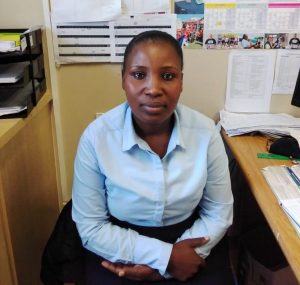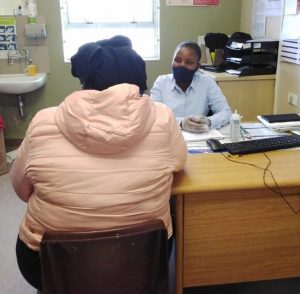Protecting Our Communities During COVID: Addressing Chronic Disease with Service Innovation
When COVID-19 hit Khayelitsha, the largest informal settlement in Cape Town, South Africa, Babalwa Nelani was frightened.
“I heard that many people who have chronic illnesses get seriously ill when they are infected with COVID-19,” Babalwa says. “I was worried I would be like them and that I would not survive if I got infected.”

Babalwa Nelani, Mentor Mother at Town II Clinic in Khayelitsha, South Africa.
As someone managing two chronic illnesses (hypertension and HIV), Balbawa knew she needed to take her health even more seriously, given her immunocompromised status. Her two young children count on her.
She also worried about the large number of people in her community living with HIV, hypertension, diabetes, and other chronic illnesses. “Most of my clients come from informal settlements where social distancing is hard. They share communal taps and toilets. It is easy for them to get infected,” she explains.
Babalwa soon learned how COVID-19 spreads and how you can protect yourself from infection from mothers2mothers (m2m), where she is employed as a frontline health worker. Since then, she and her fellow Mentor Mothers—who have been designated essential health workers during the national lock down—have been sharing this information with women and families in their community, supporting them to stay on current treatment plans and access the health services they need, which is more critical than ever during the pandemic. “We make sure our clients are taking their treatment and wearing masks if they need to go out for necessities. We really hammer on treatment adherence,” Babalwa explains.
Babalwa’s story is one that has been repeated many times since coronavirus began to spread across the African continent. m2m responded quickly, adapting our programme so that we could continue providing essential services and support to our clients, while keeping them and our frontline staff healthy and safe.
When clients are unable to visit the health centre, Mentor Mothers provide services and support to them by phone. Recently, we launched the Virtual Mentor Mother Platform (VMMP)—an interactive tool run on the messaging platform WhatsApp—which enables users to access vital health information and referrals on critical health issues from a trusted source at their convenience, in over 30 languages, and which they can easily share with family and friends.
Additionally, given that hypertension, obesity, and diabetes are the most common comorbidities with COVID hospitalisations, m2m’s plans to expand to more integrated care including these conditions became even more crucial. We responded by launching a pilot, with support from the Medtronic Foundation, to improve diabetes, hypertension, and other noncommunicable diseases (NCDs) in Khayelitsha.
“Empowering and protecting frontline health workers, especially Mentor Mothers, is key to improving health for all, and COVID-19 has made this even clearer,” says Jessica Daly, Director of Global Health, the Medtronic Foundation. “We’re proud to partner with m2m to expand their evidence-based patient-centered model for HIV care to other chronic conditions including diabetes and hypertension. Providing opportunities for the people of Khayelitsha to better manage noncommunicable diseases is one of the ways the Medtronic Foundation strives to improve the lives of communities around the world.”
Through this new initiative, Mentor Mothers, like Babalwa, are providing education, support, and referrals to prevent and manage NCDs for the first time in our 19-year history. The Department of Health uses a paper-based system for chronic clients and m2m aligns with this system in order to identify, track, and manage clients to ensure high risk patients reduce/manage blood sugar and blood pressure levels.

Babalwa speaks with a client at Town II Clinic.
Babalwa says these new services are critical for her community. “Often, a patient will leave the doctor’s room without fully understanding why they need to take their treatment every day or why they have to start eating better,” she explains. “They think that they need to join expensive gyms or buy special gear to exercise, or that eating a good diet means buying expensive food or eating lettuce three times a day.”
“Mentor Mothers are here to show them that we too are everyday people, who eat the same food they eat in their homes and live in the same environments they do. We also have to make the same changes to our own lifestyles that we are telling them to make in theirs,” she adds. “Our experience working with HIV and changing people’s point of view comes in very handy when we talk to clients with diabetes or hypertension.”
These new services are initially being piloted at two health facilities in Khayelitsha. Through this partnership m2m aims to enroll 922 patients, improving a third over the course of 10 months by reducing blood pressure and blood sugar levels—at a time when it’s most needed. We began enrolling in late July and have thus far enrolled 299 clients with uncontrolled hypertension and/or diabetes. If successful, m2m plans to evaluate opportunities to roll these services out to additional members in 2021 and beyond.
Dr. Kathrin Schmitz, m2m’s Director of Programmes and Technical Support, said: “At m2m, our programme design and delivery has always been driven by the needs of our clients. With NCDs an increasing challenge in the communities we serve, it is vital that we are able to respond, and we thank Medtronic Foundation for making this a reality. To successfully identify, treat, and manage NCDs, we need people to access services, get tested, and start and stay on any treatment they need. m2m has been doing this successfully for many years in a range of other areas, most notably HIV, and we are excited to once again evolve and expand our model.”
If COVID has taught us anything, it’s that the road ahead won’t be easy, but that together, we can overcome new barriers and ultimately hope to build a more efficient, scalable, and integrated model as a result. In 2021, m2m seeks to have results from this initial pilot.
For more information on this new initiative, please click here to see the Fact Sheet.
About Non-Communicate Diseases
Non-Communicable Diseases (NCDs) are a large—and growing—public health issue in sub-Saharan Africa. Deaths as a result of NCDs—which include diabetes, cardiovascular disease, and hypertension—are predicted to grow by 27% across the region in the next decade, translating into an additional 28 million deaths from these conditions. In fact, NCDs are expected to overtake communicable, maternal, neonatal, and nutritional (CMNN) diseases combined as the leading cause of mortality in sub-Saharan Africa by 2030, while in South Africa, 51% of deaths are already caused by NCDs.
What is more, the impact of NCDs could be more severe across the continent, as it has the largest number of people living with HIV in the world. According to the World Health Organization, people living with HIV are at increased risk of developing a range of NCDs, including cardiovascular disease, diabetes, chronic lung disease, and some types of cancer. Just as worrisome, people living with these health conditions are at increased risk of serious complications from COVID-19, which is spreading across the African continent.






















